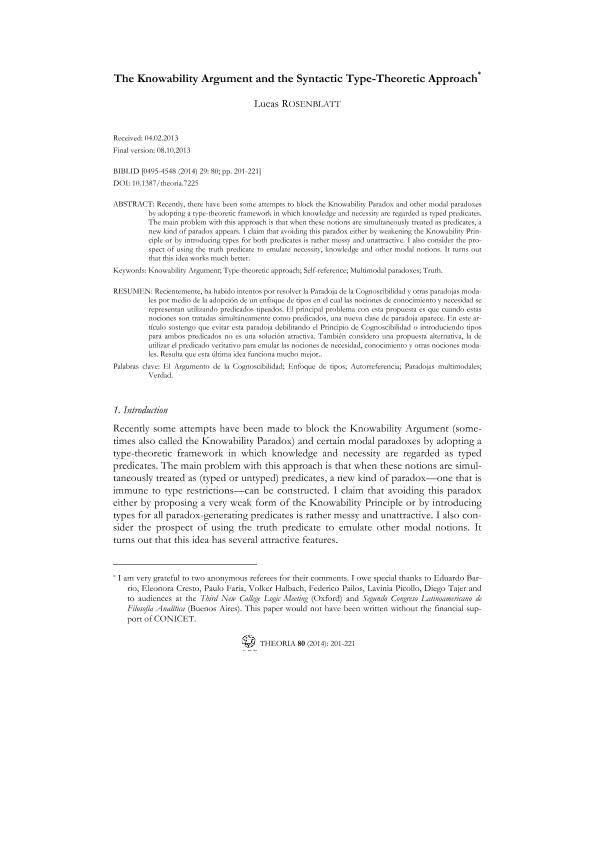Mostrar el registro sencillo del ítem
dc.contributor.author
Rosenblatt, Lucas Daniel

dc.date.available
2016-12-12T20:23:55Z
dc.date.issued
2013-10
dc.identifier.citation
Rosenblatt, Lucas Daniel; The Knowability Argument and the syntactic type-theoretic approach; Universidad del País Vasco; Theoria; 29; 2; 10-2013; 201-221
dc.identifier.issn
0495-4548
dc.identifier.uri
http://hdl.handle.net/11336/9158
dc.description.abstract
Recently, there have been some attempts to block the Knowability Paradox and other modal paradoxes by adopting a type-theoretic framework in which knowledge and necessity are regarded as typed predicates. The main problem with this approach is that when these notions are simultaneously treated as predicates, a new kind of paradox appears. I claim that avoiding this paradox either by weakening the Knowability Principle or by introducing types for both predicates is rather messy and unattractive. I also consider the prospect of using the truth predicate to emulate necessity, knowledge and other modal notions. It turns out that this idea works much better.
dc.description.abstract
Recientemente, ha habido intentos por resolver la Paradoja de la Cognoscibilidad y otras paradojas modales por medio de la adopción de un enfoque de tipos en el cual las nociones de conocimiento y necesidad se representan utilizando predicados tipeados. El principal problema con esta propuesta es que cuando estas nociones son tratadas simultáneamente como predicados, una nueva clase de paradoja aparece. En este artículo sostengo que evitar esta paradoja debilitando el Principio de Cognoscibilidad o introduciendo tipos para ambos predicados no es una solución atractiva. También considero una propuesta alternativa, la de utilizar el predicado veritativo para emular las nociones de necesidad, conocimiento y otras nociones modales. Resulta que esta última idea funciona mucho mejor.
dc.format
application/pdf
dc.language.iso
eng
dc.publisher
Universidad del País Vasco
dc.rights
info:eu-repo/semantics/openAccess
dc.rights.uri
https://creativecommons.org/licenses/by-nc-sa/2.5/ar/
dc.subject
Knowability Argument
dc.subject
Type-Theoretic Approach
dc.subject
Self-Reference
dc.subject
Multimodal Paradoxes
dc.subject.classification
Filosofía, Historia y Filosofía de la Ciencia y la Tecnología

dc.subject.classification
Filosofía, Ética y Religión

dc.subject.classification
HUMANIDADES

dc.title
The Knowability Argument and the syntactic type-theoretic approach
dc.type
info:eu-repo/semantics/article
dc.type
info:ar-repo/semantics/artículo
dc.type
info:eu-repo/semantics/publishedVersion
dc.date.updated
2016-11-24T18:38:55Z
dc.identifier.eissn
2171-679X
dc.journal.volume
29
dc.journal.number
2
dc.journal.pagination
201-221
dc.journal.pais
España

dc.journal.ciudad
Madrid
dc.description.fil
Fil: Rosenblatt, Lucas Daniel. Consejo Nacional de Investigaciones Científicas y Técnicas; Argentina
dc.journal.title
Theoria

dc.relation.alternativeid
info:eu-repo/semantics/altIdentifier/url/http://www.ehu.eus/ojs/index.php/THEORIA/article/view/7225
dc.relation.alternativeid
info:eu-repo/semantics/altIdentifier/url/https://dialnet.unirioja.es/servlet/articulo?codigo=4742639
dc.relation.alternativeid
info:eu-repo/semantics/altIdentifier/url/http://www.redalyc.org/articulo.oa?id=339732249002
dc.relation.alternativeid
info:eu-repo/semantics/altIdentifier/doi/http://dx.doi.org/10.1387/theoria.7225
Archivos asociados
